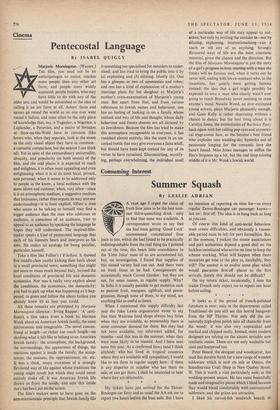Cinema
Pentecostal Language
QUIGLY By ISABEL Marjorie Morningstar. (Warner.) THE film, you need not be an anthropologist to notice, reaches more people than any other art form; and people more widely V scattered; people besides, who may have little to do with any of the older arts and would be astonished at the idea of calling it an art form at all. Actors' faces and names go round the world as no one ever went round it before, and must often be the only piece of knowledge that, say, a Yugoslav, a Nigerian, a Laplander, a Peruvian, and a native of Swindon or Stow-on-the-Wold have in common (like lovers who, when they separate, look at the moon as the only visual object they have in common : a romantic comparison, but the nearest I can think of). Yet in spite of the extraordinary universality, ubiquity, and popularity (in both senses) of the film, and the odd places it is expected to reach and enlighten, it is often most appealing and even enlightening when it is at its most local, private, and personal; when it seems to be addressed only to people in the know, a local audience with the same idiom and customs; when, very often—since it is an atmospheric medium, a suggestive medium that insinuates, rather than argues, its way into our understanding—it is least explicit. Often a man who seems to be talking to himself may find a bigger audience than the man who addresses an audience, is conscious of an audience, tries to appeal to an audience by speaking the language he hopes they will understand. The inspired-film- maker speaks a kind of pentecostal language that each of his listeners hears and interprets as his own. He makes no apology for being peculiar, particular, himself.
Take a film like Fellini's I Vitelloni. It showed five middle-class youths kicking their heels about in a small provincial town; something that might not seem to mean much beyond Italy, beyond the local conditions of provincial life and domestic economics. Nor was it really very explicit about the conditions, the economics, the domesticity; you had to pick up what was happening as it hap- pened, to guess and follow the idiom (unless you already knew it) as best you could.
All these remarks are prompted by Marjorie Morningstar (director : Irving Rapper : `A' certi- ficate), a film taken from a book by Herman Wouk about an American Jewish family, the most microcosmic unit imaginable. The novel concen- tratetl at length—at rather too much length—on showing what it felt like to belong to an American Jewish family : the atmosphere, the background, the surroundings, the appearance of things, the reactions against it inside the family, the accep- tances, the cosiness, the oppressiveness, etc. etc. It was a thick, soupy evocation of a strongly flavoured way of life against whose traditions the young might revolt but which they could never entirely shake off. It was American Jewish life shown us from the inside; and now this inside story has been put on the screen.
The film's makers seem to have gone on the non-microcosmic principle that Jewish family life is something too specialised for outsiders to under- stand; and has tried to bring the public into it by (a) explaining and (b) diluting. Mostly (b). One has a glimpse or two of ceremonies and robes; and one has a kind of explanation of a mother's marriage plans for her daughter in Marjorie's mother's cross-examination of Marjorie's young man. But apart from that, and from various references to Jewish names and behaviour, one has no feeling of looking in on a family whose outlook and way of life and thought, whose daily behaviour and future dreams are all dictated by its Jewishness. Because the film, has tried to make this atmosphere recognisable to everyone, it has vanished almost entirely, like the scent in an un- corked bottle that may give everyone a faint whiff, but should have been kept corked for any of its virtue to have remained. Disconcerting, mystify- ing, perhaps overwhelming, the individual smell of a particular way of life may appear to out- siders; but only by inviting the outsider in—not by diluting, explaining, internationalising—can it teach or tell any of us anything. Strongly flavoured ways of life are the most cinematic material, given the chance and the direction. But the film of Marjorie Morningstar is just the story of a girl's progress in love, starting with a-man she thinks will -be famous and, when it turns out he never will, ending with his ex-assistant who, in the meantime, has quietly been getting famous instead; the idea that a girl might possibly be expected to love a man who clearly wasn't ever going to reach Broadway never seeming to cross anyone's mind. Natalie Wood, an over-estimated young actress, plays Marjorie pleasantly enough, and Gene Kelly is rather depressing without a chance to dance; but the best thing about it is Carolyn Jones, the existentialist of Bachelor Party back again with her rolling pop eyes and asymetri- cal tragi-comic face, as the heroine's best friend who explodes into wedding-day hysterics out of passionate longing for the romantic love she hasn't found. Miss Jones manages to stiffen the film's limpness up a bit, but the real limp missing middle of it is Mr. Wouk's Jewish world.


































 Previous page
Previous page